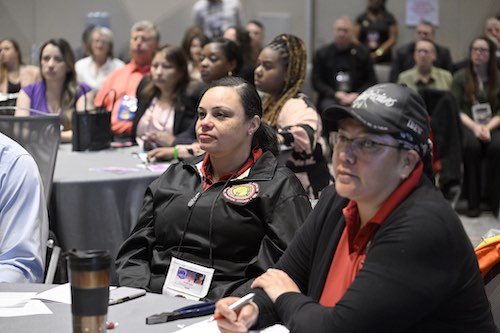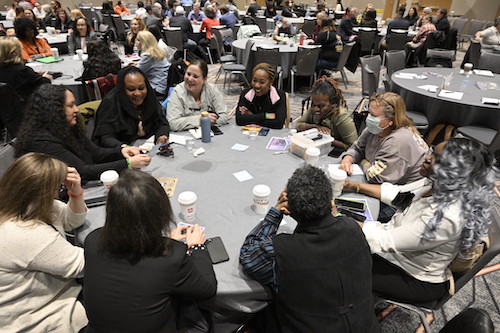More than 300 IBEW delegates and guests to the IBEW’s 40th International Convention came together for the Women’s Caucus on May 6 to discuss topics ranging from maternity leave to mentoring to mansplaining.

|
| More than 300 delegates and guests attended the pre-convention caucus.
|

|
|
Attendees listened to discussions of topics ranging from maternity leave to mentoring to the gender pay gap.
|
“The state of women and the state of women workers is not where it should be,” said Director of Civic and Community Engagement Tarn Goelling as she kicked off the event.
Goelling talked about the ever-persistent wage gap and how only about 3-4% of the construction workforce is women, as well as the family-related issues that tend to disproportionally fall on women.
“One of the problems we have is a cultural one,” Goelling said. “There is an assumption that family issues are only women’s issues. And that affects the way we interact with each other on a daily basis.”
Goelling also noted that when we demand equity, we can’t focus solely on wages.
“Equity also encompasses every other bit of what we consider to be life, from the moment you wake up until you lay your head on the pillow again,” she said. “If we are able to improve upon the social bounds of what we expect, we can improve the lives of not just women, but of everyone of all genders. This is what we are here to fight for.”
Next up was International President Lonnie R. Stephenson.
“Let me just say how excited I am to be all with all of you,” he said. “You feel the energy in the room.”
Stephenson noted that this convention will be the first one to elect a woman as vice president, Gina Cooper from the Fourth District.
“We’ve got a lot to be proud of,” he said. “The IBEW is leading in many ways and we couldn’t do it without all your help.”
Stephenson also said the IBEW is seeing more women in leadership positions, like executive boards, training directors, and even presidents and business managers.
“It’s a culture change for all of our local unions. It’s a culture change that’s been needed for a long time, but we’re going to be a better organization because of it.”
Stephenson spoke about IBEW Strong, the union’s diversity, equity and inclusion initiative, and singled out Boston Local 103’s efforts, which he said is just one example among many. Local 103’s recent retiring class was 95% white and male, he said, but the upcoming apprenticeship class is nearly 40% women and people of color.
“Local 103 has been aggressive about connecting women with the opportunities of the electrical trades, from running targeted ads to talking to girls in high school,” he said. “We really need to be talking to them before they’re in high school. We need to be talking to them when they’re young, and maybe a middle school-type age, so they know that it’s OK to be a woman and get your hands dirty.”
With the skilled-trades shortage happening across North America, there’s a very real need to get more women and people of color into the trades, especially with all the work that will come from the infrastructure bill.
“If we don’t step up and organize and bring women and people of color into our programs, if we don’t provide those opportunities, we’re not able to get the workforce for that work,” Stephenson said. “We can’t let that happen. We need to grow and find ways to help them be successful, not keep them out.”
Stephenson went on to say that women workers and women leaders are how we are going to regain power and our place at the table.
“Women are going to play a significant role in the next chapter of the IBEW history. And I look forward to continuing to work with all of you as we write that history together,” he said.
International Secretary-Treasurer Kenneth Cooper emphasized the importance of women being active not just in their locals, but politically, especially with the 2022 midterms just around the corner.
“Everything we’ve fought for is on the ballot this year,” he said. “Our jobs are on the ballot, our union is on the ballot, and yes, our right to vote too.”
Cooper urged the audience to remember which politicians sided with unions on issues like pensions and the infrastructure bill that will create millions of good union jobs. And he said that the right to vote is a union issue.
“If we don’t have the right to vote, we don’t have the right to organize,” he said.
Mentoring was a recurring topic throughout the caucus and one that Fourth District Vice President Gina Cooper talked about.
“What exactly is a mentor? It can be a lot of different things,” she said. “A mentor is someone who took me under their wing and helped teach me and guide me in the workings of our great union.”
Cooper also talked about the importance of retention and how it’s tied to being a mentor, even if it’s just informally.
“Every single one of us should be a mentor to the new members that are coming into the IBEW every single day,” she said.
The caucus also included two “Herstory” sessions, where members shared their personal stories. One was Melissa Reyes from Charlotte, N.C., Local 379. She told the audience how she ran away from home at a young age, only did the bare minimum to graduate high school and didn’t see herself going to college.
“I faced a lot of hardships growing up, but I wouldn’t change one bit of it if it meant not being where I am today,” Reyes said.
Fortunately, Reyes had a mentor who helped her eventually get into Local 379’s apprenticeship.
“My story is a clear example that you can’t be what you can’t see,” she said. “The IBEW gave me a sense of purpose that I had been lacking for a while. I have a craft that I can consistently try to be better at and has put me on a straight path. I’ve flourished into a responsible adult with a sense of economic independence I never thought I could achieve.”
Now she’s active in her union and wants to do her part to help bring more women in.
“We are all the union, not just the organizers at the hall,” Reyes said. “If we don’t do what we can to keep this organization strong for ages to come, then who will?”
The other “Herstory” speaker was Sixth District International Representative Cheri Stewart. She said that attending the Sixth District Women’s Conference was where she realized she belonged. From there she got involved in her union, Kalamazoo, Mich., Local 131, eventually becoming the first woman on staff.
“I know, and sometimes I have to remind myself, that I’ve earned it and I belong here,” Stewart said. “I’ve learned to never allow someone else to take away my pride and my happiness with what is truly their own insecurity.”
Now Stewart hosts the Sixth District women’s conference.
“Please be that journeyman who brings the new workers to their first union meeting. She may one day run that meeting,” Stewart said.
Another recurring theme was maternity leave. Portland, Ore., Local 48 Business Manager Garth Bachman spoke on a panel where he shared the story of how his local and others in Oregon were able to provide the benefit to pregnant members. It allows for six months of paid leave, with 13 weeks being available prior to the expected due date and 13 more available after.
“I know this doesn’t solve all the problems that we have, but it’s a start,” Bachman said. “Something like this is really not that difficult. It’s not that expensive. It could be done throughout the entire IBEW.”
The women’s caucus wasn’t just attended by women either. Many of the tables were filled with male allies, like Vacaville, Calif., Local 1245 Business Manager Bob Dean.
“For us to thrive and get stronger, we have to be inclusive. It can’t be a club,” Dean said. “They shouldn’t have to beat a door down. We should just open the door.”
Local 1245 President Cecilia De La Torre also noted the presence of so many men in attendance.
“To see their support is outstanding,” said De La Torre, who is the local’s first woman president. “When I first started coming it wasn’t like that. And there’s a lot further we need to go.”